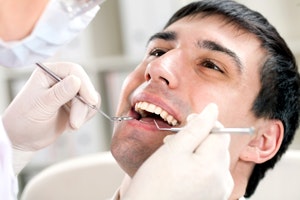How often should you go to the dentist for a check-up?

The common advice is that dental check-ups should be done every six months, but the truth is actually a little more complex than this. Some people need to visit the dentist far more frequently than this, and others can get away with less frequent trips.
After your dentist examines your mouth and determines your overall oral health, he or she will suggest when you should come next time for your regular check-up. The time between dentist check-ups is variable and ranges from a couple of months to a couple of years, mostly depending on the state of your teeth and gums.
Why are regular dental checkups important?
A dental check-up is required so that the dentist can examine your teeth and gums. They look for oral health problems and suggest ways for you to keep your mouth and gums healthy. If you leave the problems untreated then you can potentially face some painful consequences later.
The reason for regular dental checkups is simply based on how quickly dental issues can progress. Young children have teeth that are changing much faster than an adult’s teeth. Their milk teeth are softer and more likely to suffer from decay. And as their adult teeth emerge, the dentist needs to monitor their teeth to ensure problems don’t arise. This is why children and young people need to visit the dentist every 6 months.
However, adult teeth don’t move as much, and adult teeth are harder and more resistant to decay. This means that it would take much longer for issues to arise, particularly if your dentist knows that you are very good at caring for your teeth. In this instance, they might suggest that you only need to visit the dentist every 1-2 years, unless you face an unexpected problem.
What does the dental check-up involve?
At the checkup, your dentist first examines your mouth, teeth, and gums. They will ask you about your overall health and whether you have had any problems with your teeth since your last check-up. The dentist will also provide advice for your diet, alcohol and tobacco use, and how to maintain good teeth-cleaning habits. At the end, they will tell you when you should visit again.
Regarding when you should visit your dentist next time, they will suggest a date. It can be in two or three month’s time or maybe in two years. In general, if you have a low risk of developing dental problems then you will wait longer for your next check-up.
People that have good oral health usually need to go to their dentist once a year. However, those who experience problems need to attend checkups more regularly. Try to stick to your dentist’s schedule as much as possible.
Which conditions require more frequent checkups?
Some conditions need to be monitored more frequently. If you have active gum disease, your dentist might ask you to visit more often, or to combine your dental checkups with dental hygienist visits.
With dental treatments such as teeth cleaning, fillings, taking a tooth out, or some kind of emergency treatment, all these may require more routine check-ups. For example, your dentist might ask you to schedule a follow-up appointment following a tooth extraction. It’s important to attend this follow-up so that your oral health doesn’t suffer.
When should I visit the dentist sooner?
If you are experiencing problems with your teeth, do not wait for your next check-up. Arrange an appointment as soon as you can so that a dentist can attend to the matter quickly. The sooner you address the issue, the sooner you can seek relief from your symptoms. Even if you are due a checkup in the next month, always visit the dentist sooner if you are in pain or have noticed things like bleeding or tender gums.
What if I haven’t been for a checkup for a long time?
We know it can be scary to return to the dentist after a long time away. The important thing to remember is that it’s important to schedule your checkup so you can get your oral health back on track.
There is no judgement for missing checkups or letting your oral health fall behind. The important thing is that you are ready to get things back on track. We provide a friendly and supportive environment that will enable you to prioritise your oral health. You don’t need to give us a reason why you haven’t been for a checkup for a while, we’ll just be happy to see that you’ve decided to resume your checkups.
If you have booked appointments in the past and then missed appointments, this could impact your standing on our patient list. Get in touch with our team to find out if you are still registered as a patient with us and to find out how you can book an appointment.
To find out more about dental check-ups, please get in touch.
Call us now to make an appointment

Keep reading...
What to expect from a trip to the dental hygienist
There are two main types of dentistry. Restorative care and preventative care. The first is the work we do when…
What Happens During a Root Canal Procedure and How Much Does It Cost?
This procedure involves removing the infected pulp from the tooth, cleaning it out and then sealing it up to protect…
How a Dental Crown Can Help to Protect Your Teeth
Despite our very best intentions we all might at some point face that dreaded realisation that one of our teeth…
Dental Resolutions to Keep Your Smile Shining Bright
Good dental health is a marker of good well being – and is vital to confidence. The key to protecting…

Hear from our
happy patients
These are just some of the kind words about our practice, direct from our incredible patients.









